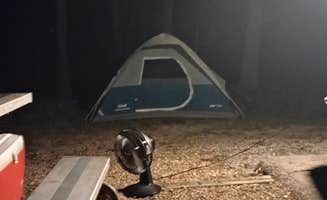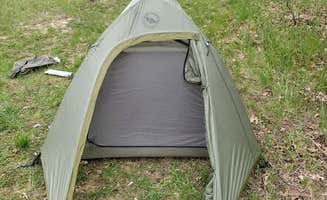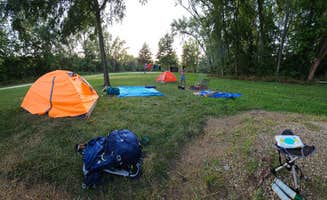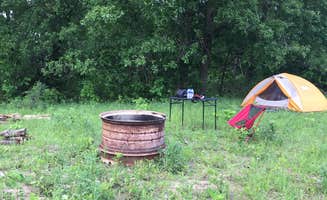Tent campsites near Ashland, Missouri range from lakeside settings to densely wooded conservation areas within a 30-mile radius. Winter temperatures typically drop to the 20s, while summer camping season brings humid conditions with temperatures in the 80s-90s. Many sites require self-sufficiency as conservation areas maintain minimal facilities and follow strict pack-in-pack-out regulations.
What to do
Explore hiking trails: Rock Bridge Memorial State Park features extensive primitive trails suitable for various skill levels. "There are beautiful sights along the way, from wildlife to old, abandoned silos. The trails were marked by distance and difficulty, ranging from easy to challenging," notes one visitor to Rock Bridge Memorial State Park.
Cool off in cave systems: The Devil's Icebox cave maintains 56°F temperatures year-round, providing relief from summer heat. A camper reported, "I found the Devil's Icebox and was rejoiced by how remarkably cool it was compared to the thick, humid summer air."
Fishing opportunities: The Gasconade River at Fredericksburg Ferry Access provides excellent fishing spots. One regular visitor states the area is "Quiet and always kept clean," making it ideal for peaceful fishing sessions without crowds.
Shooting practice: Several conservation areas maintain shooting ranges for target practice. Rudolf Bennitt Conservation Area has "a shooting range centrally located in the park," according to a camper who stayed for over a week.
What campers like
Natural privacy barriers: Most conservation areas feature thick forest that creates natural sound buffers between campsites. At Rudolf Bennitt Conservation Area, campers appreciate that it's "Heavily forested with a lake. Trails and camping areas in woods are setup for equestrian with good trails for hikers, bikers and horses."
Stargazing opportunities: The minimal light pollution allows for exceptional night sky viewing. At Fredericksburg Ferry Access, campers report "Lots of trees but still great stargazing at night. We even saw a few meteors!"
Multiple water features: Many sites offer both lake and river access within short walking distance. A visitor to Scrivner Road Conservation Area describes it as "a Swiss Army knife of rugged off the path camping. Rivers, Lakes, Gun range, Horses and hiking can all be enjoyed here."
Level tent pads: Many sites feature flat, non-rocky ground ideal for tent setup. One camper notes about Fredericksburg Access, "Ground is very level and not super rocky so this is a great site for tents."
What you should know
Limited facilities: Most conservation areas provide only vault toilets with no running water or trash service. A camper at Ben Branch Lake Conservation Area reports, "Vault toilets available. Quiet. No water, hook ups or picnic tables, but fire rings."
Supply planning required: Nearest stores can be 30-45 minutes away, requiring careful trip planning. One camper at Fredericksburg Ferry Access advises, "45m to nearest Walmart or tractor supply, so plan ahead. Food, fire starter logs, and lighter fuel available at Thriftway (about 30 min)."
First-come, first-served system: No reservation systems exist at conservation areas. Pikes Camp is described as a "Great little hideaway. FCFS," meaning campers should arrive early during peak seasons.
Cell service varies: Some sites maintain reasonable connectivity while others have limited coverage. At Ben Branch Lake, a camper reported having "service of at least 2-3 bars entire time."
Tips for camping with families
Water safety awareness: River crossings require careful consideration for children. At Fredericksburg Ferry Access, a camper cautions, "The swim there requires crossing a moderately sized river that is relatively swift. This is fine for people who swim well but not recommended for young children or weak swimmers especially without flotation devices."
Educational opportunities: Caves and natural features provide learning experiences. Rock Bridge Memorial State Park offers "beautiful wooden boardwalks that meander through the trees" where "a number of families with little children ran around enjoying the boardwalks, ascending and descending the stairs built into the hills."
Wildlife viewing: Conservation areas support diverse animal populations. At Scrivner Road Conservation Area, a camper describes it as having "an abundance of wildlife" along with equestrian trails and hiking opportunities.
Weather considerations: Seasonal flooding affects site conditions. At Franklin Island, a camper notes it can get "muddy due to seasonal flooding," which requires preparation when camping with children.
Tips from RVers
Site accessibility: Most conservation areas have limited improvements for RV access. At Pikes Camp, campers find "a shaded grassy area for camping. No power vault toilets," making it suitable for self-contained RVs only.
Road conditions: Gravel and dirt access roads can become challenging after rain. One camper notes about Fredericksburg Access that the "Drive was safe in our heavy converted camper van. No off road vehicle or AWD needed" following recent rain, but conditions vary seasonally.
Parking surfaces: Most sites offer gravel or grass pull-ins rather than paved pads. At Rudolf Bennitt Conservation Area, "Camping at lake is open gravel or grass," which affects stabilization requirements for larger vehicles.





